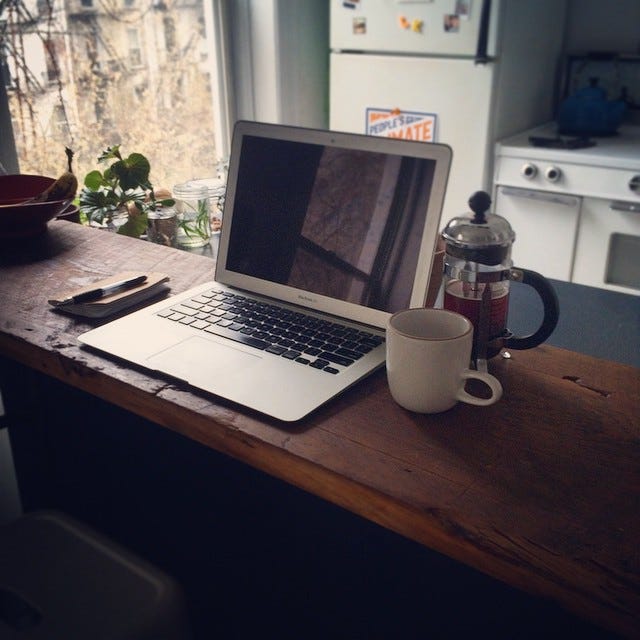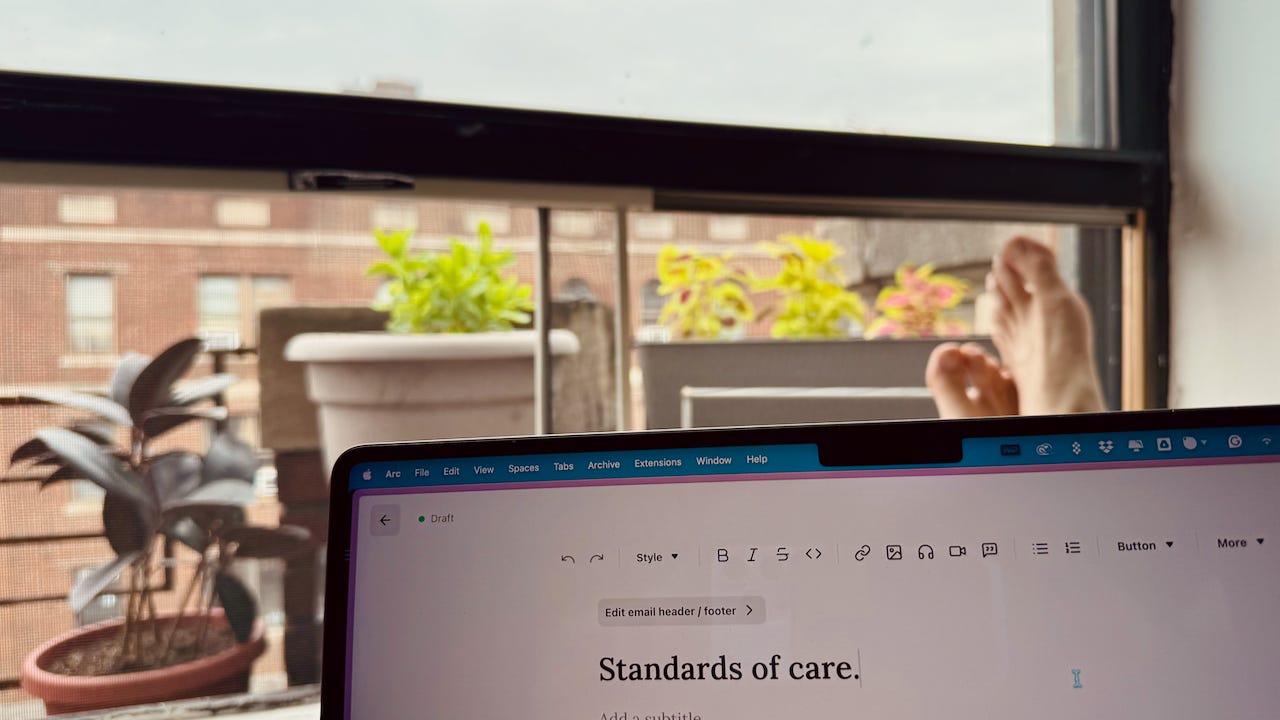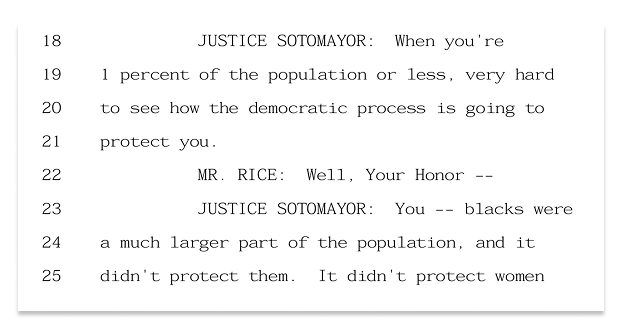Hi.
When I first moved to NYC and was trying to make it as an independent filmmaker, I regularly posted pics of my new digital nomad life tagged #todaysoffice. After ten years of commuting to the same office, I was constantly struck by the novelty of my post-Pixar life working from anywhere and everywhere. Apparently, all I needed was a laptop and coffee.
#todaysoffice is my living room, looking out at some overcast skies and new greenery.
This is my fourth (or fifth?) attempt to create an outdoor garden in the space an ambitious realtor would enticingly describe as a balcony, only to then disappoint you with its uninhabitable design. Humans can most definitely not safely occupy this territory; the question remains whether or not this human can help plants take root instead.
With at least a dozen already-in-progress house projects and a life list a mile long—of course!—I became possessed last night with gardening. Why? Because I checked the weather and there seems to be a four or five-day pocket of milder spring weather before it’s over 80 again. And because I want to plant before it rains. And because I look out this window 100x a day and think about how much nicer it would be with some green. And because I have travel coming up. And because I’m avoiding that long list. And, really, because my nervous system is tapped out. I needed to touch something that wasn’t connected to a battery. I needed dirt. And beauty. And the hope of new growth.
Because after ten days of extraordinary stimulus of every category, I made the questionable decision this weekend to tune into NYT’s just-released podcast: The Protocol. The six-part audio documentary tries to answer the question of how we got to the current “controversial debate over health care for trans youth.” I listened to the first two episodes yesterday, even though multiple friends asked me if this was an act of self-harm, and then spent the evening researching plants. I listened to the rest of the series today while I planted, plastered, sanded, scrubbed, cleaned, fixed… and tried to breathe.
I’m in no shape to review the podcast formally.1 Maybe I will, maybe I won’t. Plenty of other people already are. You might see a headline or take telling you not to listen, or that it is inherently anti-trans. Maybe it is. It’s very hard to listen to a lot of cis people talk about what they think is best for a trans person. While the conversation is ostensibly about the children, any trans person knows that the arguments are really about all of us. The entire debate feels predicated on the assumption that being trans is a negative outcome, a deficiency, a disability, an undesirable way to be, something we must keep the children from becoming.
But here’s why I think you should listen: because the audio of trans people speaking for themselves is incredible. NYT deserves tremendous criticism for their coverage of trans people over the last five years, and also, I applaud The Protocol’s producers for this:
The entire first episode centers the story of the first person to receive puberty blockers to treat his adolescent gender dysphoria. He’s 51 now. And happy.
The final episode features audio from parents and trans people describing what gender-affirming care means for them. And how losing access to that care is creating real, material suffering.
Finished with my housework and utterly overwhelmed by binging The Protocol, I collapsed into the butterfly chair by my newly planted garden and listened to the final twenty minutes. I anxiously awaited who the producers would give the last word. I started to cry, hand to heart, listening to the last transgender voice you hear (listen at 43:10):
Now that I'm an adult, I realized that I was not only saved by this care, but I was also saved by time. I've witnessed the attacks on medical care that allowed me to become the man I am today. And it makes my stomach churn to think that, had I been born in a different state, or even if I had been born 10 years later, that I could have been forced into a life that I don't even know how to conceptualize.
And I know that this debate is complicated. I know that not all kids have the same unwavering sense in their gender identity. It doesn't always happen that way.
And I know that regret and detransition are really issues that we need to be careful of. And, you know, the dealing with minors feels especially complicated for families. But banning that care doesn't solve that issue.
When I first walked into the gender clinic, you know, at 12 years old, I thought things were only going to get better for kids like me. And I certainly could not have imagined that 10, 15 years later, I would be witnessing that unraveling, and that I would be making this recording, and making this plea to anybody listening to just let us live.
At some point this month, the Supreme Court will weigh in on gender-affirming healthcare bans in United States v. Skrmetti. No matter what happens, and I’m not hopeful, there will be a maelstrom of coverage where pundits debate the legal ramifications of the decision, and by proxy, continue to litigate the rights of trans people broadly. What will get lost in the noise, I’m sure, are our own voices.
xx Kyle
Being Alive Book Club is reading Tourmaline’s MARSHA this month!
Option A: Read alongside me by reading this newsletter and enjoying the book in the format of your choosing.
Opt B: Discuss with other readers in the Being Alive Book Club chat.
Opt C: Join our book club hang on Zoom Monday, June 30th. RSVP at this link. I know 5p PT is early for the west coast folks; considering doing a two-part gathering 7p ET and then again at 6p PT. Would that work better for the west coast folks? Reply over email or comment to let me know what you think.
The cover art is another story. I’m a fan of NYT’s audio/podcast art and generally love illustrator Christiana Couceiro’s work. But, what? Why?









Thank you for sharing your experience listening to this, and I apologize on behalf of everyone who has made existence into the "controversial debate" this podcast describes. I listened to the first episode and was pleasantly surprised, mostly expecting it to be a continuation of their pattern of deferring to bad science. I'm adding the rest of the episodes to my queue now. I assume I'll hear some really dumb stuff at some parts, but your recommendation was enough for me to give it all a listen. Regardless of how great or not great this series is, I do hope to write something soon about how mainstream journalism has been failing trans people.
From what I've learned via a webinar for health/mental health care professionals and reading (news and political junkie that I am), so far, it seems gender affirming care will remain available to people who have health insurance that's not Medicaid, Medicare or part of the Affordable Care Act.
I'm not sure but I think that leaves people who have health insurance through an employer. There might be more options that I don't know of.
Basically, it's privatization of access to gender affirming care.
If the budget bill (I refuse to call it "the big beautiful bill") passes with those provisions intact, along with the cuts to Medicare and Medicaid, healthcare in general will become far less accessible for everyone who lives in areas where those Federally-funded programs fund most of the healthcare. That's most likely everywhere in the US except for big cities like DC, NYC, SF, Chicago. Hospitals and outpatient practices will consolidate and/or move to big cities like DC, NYC, SF.
If an outpatient clinic, like Whitman-Walker Clinic, or a hospital that's been providing gender affirming care receives any funding from Medicaid or Medicare, they will no longer legally be allowed to continue to do so. So, what alternatives does that leave? If people can afford to pay privately, there'll be private clinics where people with the "right" health insurance or enough cash to pay out-of-pocket can receive gender affirming care.
Some people will leave the US.
This may sound weird but I'm hoping Amazon, with its frankly impressive entry into the healthcare market, will offer affordable gender affirming care. That might be naive. But, Amazon has provided impressive access to excellent care throughout the covid-19 pandemic, which is continuing, btw. One Medical in the DC area has been great so far. So, who knows? Maybe, Amazon will see the market and, thanks to capitalism, go for it.
Now, I'm going to listen to The Protocol.
Thanks, Kyle!